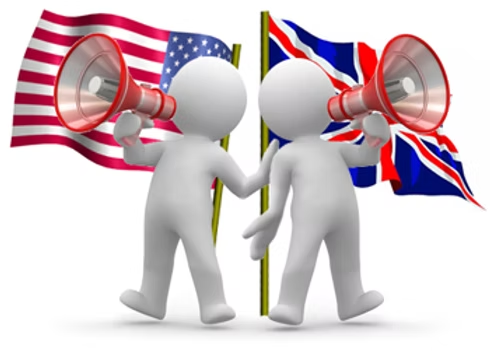American ENGLISH vs British ENGLISH
- Prabhu J
- 5 days ago
- 4 min read

The language that is spoken the most over the globe is English. Despite having its roots in the UK, it is now the official language in the US, Canada, Ireland, New Zealand, and Australia.
But things don't stop there. English is recognized as an official language in more than 60 nations. The vast majority of people who can speak English aren't even natural speakers; they picked up the language as a second language instead! This explains why learning English is the most popular foreign language.
According to Christine Kenneally in her book "The First Word," "Today there are about 6,000 languages in the world, and half of the world's population speaks only 10 of them. English is the single most dominant of these 10.1 British colonialism initiated the spread of English across the globe; it has been spoken nearly everywhere and has become even more prevalent since World War II, with the global reach of American power."
The influence of the English language has also spread globally through American pop culture, music, movies, advertising, and TV shows.
However, there is an old saying that America and Britain are “two nations divided by a common language.” Like any language, English has many varieties. The best-known varieties are British and American English.
In this blog we'll get to know about the differences between American and British English.
The Four major differences between American and British English are:

Accent - differences in accent in both British and American English.
Vocabulary - differences in nouns and verbs, especially phrasal verb usage and the names of specific tools or items.
Spelling - differences are generally found in certain prefix and suffix forms.
Grammar differences - Aside from spelling and vocabulary, there are certain grammar differences between British and American English.
Accent

It’s difficult to make clear distinctions between U.S.A and U.K. accents when there is such a wide variety of accents within both the U.S.A and the U.K. However, some very general distinctions can be made.
Americans usually pronounce every “r” in a word, while the British tend to only pronounce the “r” when it’s the first letter of a word.
The accent represents the most noticeable difference between British and American English, there are also words that differ completely depending on whether you are in Europe or across the America.
For example, what Americans call a “sweater” is known as “jumper” or “pullover” in the United Kingdom.
In the same fashion, what is known as football across the European continent, Americans call soccer.
Vocabulary

The largest differences between British and American English lie in the choice of vocabulary. Some words mean different things in the two varieties, for example:
Britishers call the front of a car - the bonnet, while Americans call it the hood.
Americans go on vacation, while Britishers go on holidays.
New Yorkers live in apartments, London live in flats.
Mean: American English - angry, bad humored, British English - not generous, tight-fisted.
American English: Don't be so mean to your sister!
British English: She's so mean she won't even pay for a cup of tea.
There are many more examples. If there is a difference in usage, your dictionary will note the different meanings in its definition of the term. Many vocabulary items are also used in one form and not in the other. One of the best examples of this is the terminology used for automobiles. --> American English - trunk / British English - boot
--> American English - truck / British English - lorry
Spelling

There are hundreds of minor spelling differences between British and American English.
When it comes to spelling, American English uses a simplified version. The explanation goes back to 1828 when Noah Webster wrote the first American dictionary – An American Dictionary of the English Language. Here are some general differences between British and American spellings:
Examples of words that end in -or in American English and -our in British English: color/colour, humor/humour, flavor/flavour
Examples of words that end in -ize in American English and -ise in British English: recognize/recognise, patronize/patronise
The best way to make sure that you are being consistent in your spelling is to utilize the spell check tool associated with your word processor and select the type of English (American or British) you'd like to use.
Grammar differences

Aside from spelling and vocabulary, there are certain grammar differences between British and American English.
For instance, in American English, collective nouns are considered singular (e.g. The band is playing).
In contrast, collective nouns can be either singular or plural in British English, although the plural form is most often used (e.g. The band are playing).
The British are also more likely to use formal speech, such as ‘shall’, whereas Americans favour the more informal ‘will’ or ‘should’.
Americans, however, continue to use ‘gotten’ as the past participle of ‘get’, which the British have long since dropped in favour of ‘got’.
‘Needn’t’, which is commonly used in British English, is rarely, if at all used in American English. In its place is ‘don’t need to’.
In British English, ‘at’ is the preposition in relation to time and place. However, in American English, ‘on’ is used instead of the former and ‘in’ for the latter.
Conclusion

While there are some differences between British and American English, the main point is that the two are more similar. Using one instead of the other by accident will not result in miscommunication. Americans and British people can usually communicate without difficulty, so don't be too hard on yourself if you can't memorise the nuances of both languages.




Comments